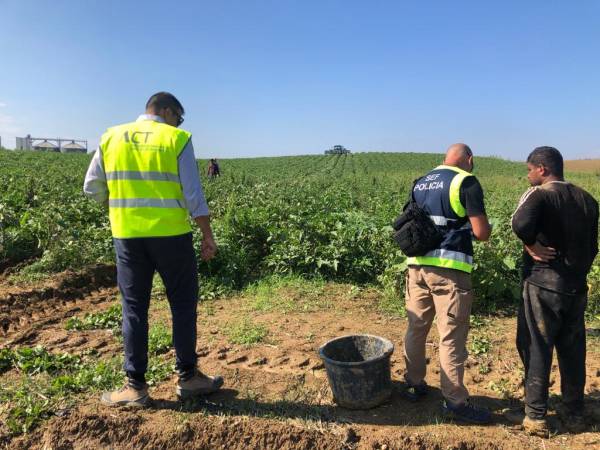EU authorities target labour exploitation in the fields
874 workers affected by labour violation or exploitation were identified during the action week
Between 14 and 21 September 2022, Europol and the European Labour Authority supported Europe-wide coordinated action days against human trafficking for labour exploitation in the agricultural sector. The operation was led by France and involved a wide range of law enforcement authorities, including police, immigration and border guards, labour inspectorates and tax authorities from 16* countries. More than 6 000 officers from national authorities took part in operational activities on the ground.
The action week resulted in:
- 17 arrests in France, Spain, the United Kingdom and Ukraine
- 42 suspected traffickers identified in Cyprus, France, Italy, Spain, Sweden, United Kingdom and Ukraine
- 874 workers affected by exploitation and labour violations identified (including 231 identified as possible victims of trafficking of human beings and exploitation)
- 4 291 locations (including vineyards and farms) checked
- 1 087 vehicles checked
- 37 017 people checked
- 36 new investigations initiated
- 192 suspected violations recorded by labour inspectors
Seasonal workers remain at high risk of exploitation
The agricultural sector is more vulnerable to exploitation practices due to various factors, including the high level of informality (undeclared or under-declared work) and the sector’s predominantly low-skilled workforce. The risk of exploitation is even higher for seasonal jobs. Criminal networks often recruit victims from their countries of origin and exploit them in other countries. Victims are then coerced into working long hours for low wages or none at all, or working in deplorable conditions with no possibility of travelling back to their home countries. EU citizens are mostly exploited in the agricultural sector year-round, while non-EU citizens are employed in seasonal work. Investigators have detected specific modus operandi used in this criminal area, including the use of look-a-like and falsified documents and forged residence permits for the exploitation of non-EU nationals and violation of minimum wage laws.
The fight against human trafficking for labour exploitation requires a consolidated, cross-border and multi-disciplinary effort by different authorities. This is the second year that the European Labour Authority has coordinated joint inspections and supported the deployment of labour inspectors from workers’ countries of origin to destination countries. Inspectors from Bulgaria and Portugal joined French authorities to inspect different locations in France, including vineyards, farms and locations operated by the forestry sector. Officers of the Finnish labour authority participated in the joint actions in Belgium involving the floriculture industry.
Europol coordinated the action days and facilitated the information exchange between the participating countries. Europol provided analytical and operational support 24/7 and facilitated the real-time exchange of communication between the participating authorities.
Participating countries: Belgium, Bulgaria, Cyprus, Finland, France, Greece, Ireland, Italy, Latvia, Netherlands, Portugal, Romania, Spain, Sweden, Ukraine and United Kingdom
***
Headquartered in The Hague, the Netherlands, Europol supports the 27 EU Member States in their fight against terrorism, cybercrime, and other serious and organised crime forms. Europol also works with many non-EU partner states and international organisations. From its various threat assessments to its intelligence-gathering and operational activities, Europol has the tools and resources it needs to do its part in making Europe safer. The European Labour Authority (ELA) was created to help Member States to effectively enforce labour mobility rules within the EU, including the coordination and support of cross-border inspections.
Tags
- Operational coordination
- Operational support
- Information exchange
- Analysis
- Intelligence
- Press Release/News
- Press Release
- Belgium
- Bulgaria
- Cyprus
- Finland
- France
- Greece
- Ireland
- Italy
- Latvia
- Netherlands
- Portugal
- Romania
- Spain
- Sweden
- Ukraine
- United Kingdom
- Other
Empact
The European Multidisciplinary Platform Against Criminal Threats (EMPACT) tackles the most important threats posed by organised and serious international crime affecting the EU. EMPACT strengthens intelligence, strategic and operational cooperation between national authorities, EU institutions and bodies, and international partners. EMPACT runs in four-year cycles focusing on common EU crime priorities.



